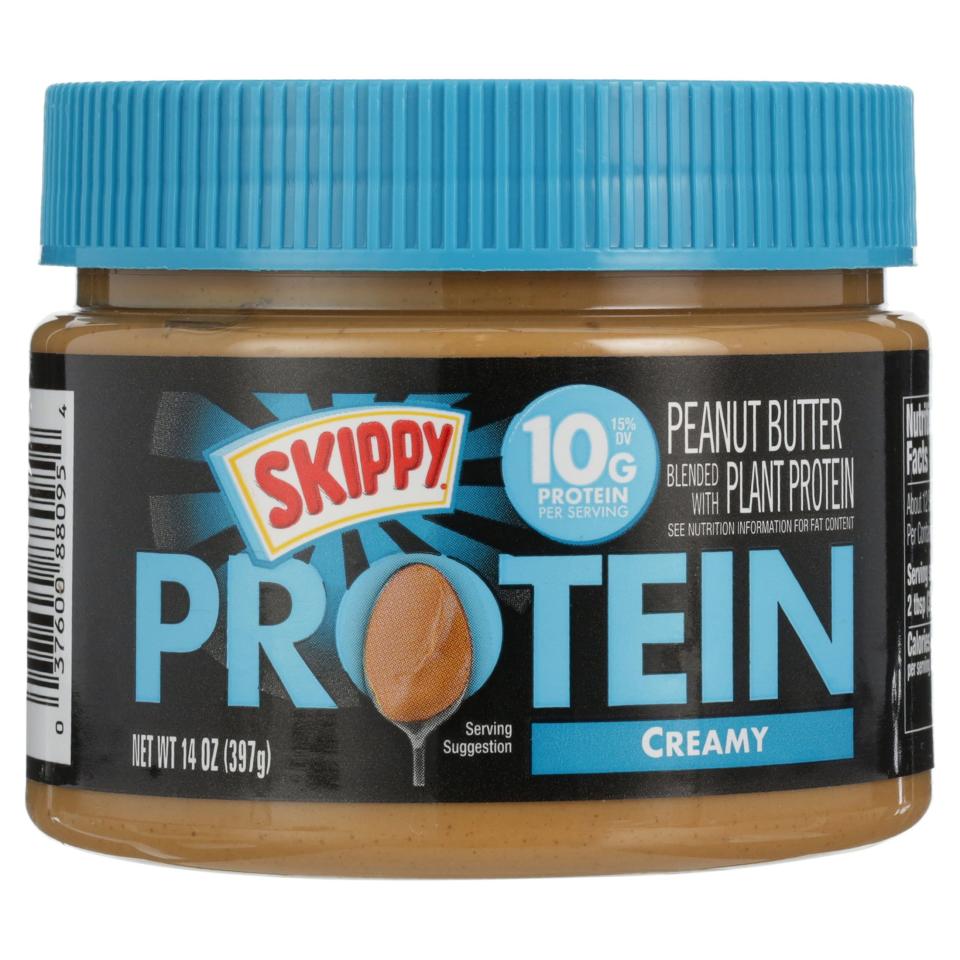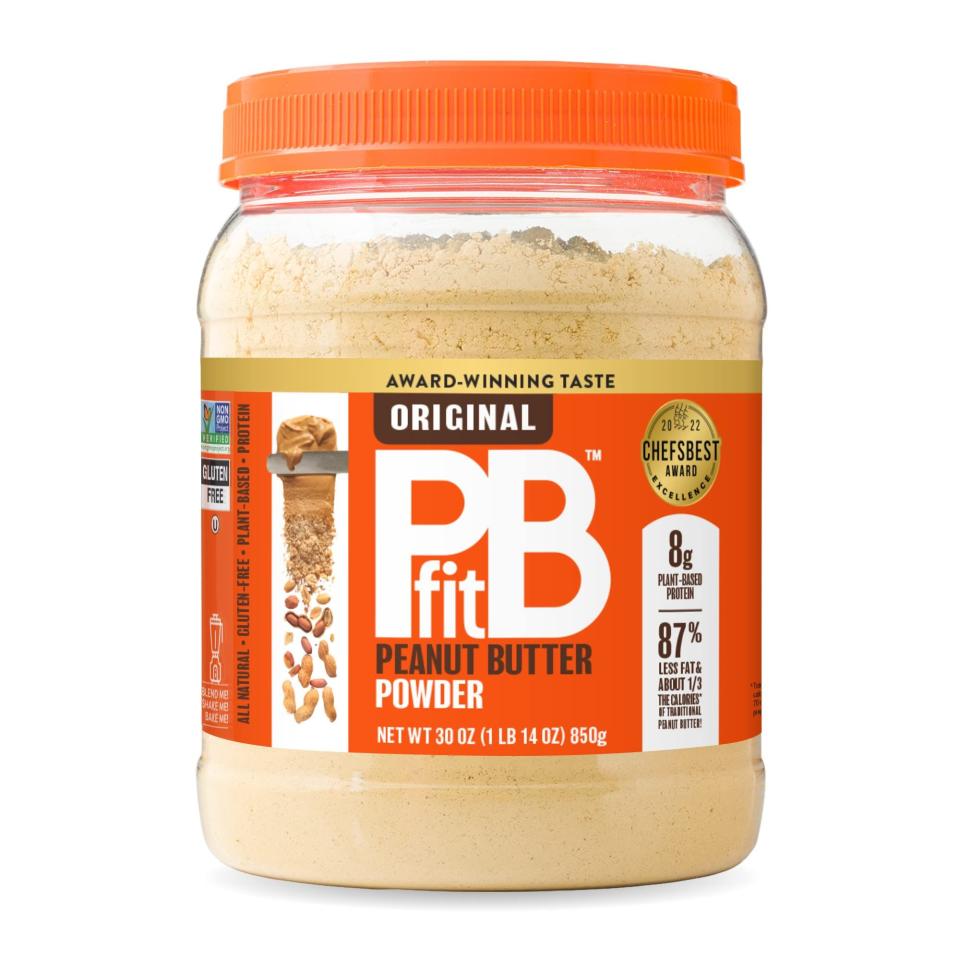Peanut Butter Is The Protein Supplement You Didn’t Know You Needed

"Hearst Magazines and Yahoo may earn commission or revenue on some items through these links."
Ah, peanut butter. It's a pantry staple that's widely beloved. It's great for the most classic of uses (hello, PB & J) to more the complicated (and delicious) protein balls. Yup. PB is pretty much a champion in any kitchen, and it's been that way for over a century.
Fun fact: the United States' use of peanut butter is actually synonymous with its protein benefit. Although peanut butter was officially introduced just before the 20th century, it really gained popularity in the 1920s when World War II caused a meat shortage, per NPR. Americans turned to the creamy dish as a substitute for the nutrients they were missing out on, and its influence on households across the nation still holds today.
Meet the experts: Rebecca Ditkoff, RD, a registered dietitian and founder of Nutrition by RD. Markita Lewis, RD, a registered dietitian and Marketing and Communications Associate for the National Peanut Board. Ginger Hultin, RDN, a Seattle-based registered dietitian nutritionist, and author of the e-book, Meal Prep for Weight Loss 101.
With it being such an influential part of American diets, it's natural to wonder how good peanut butter actually is for you. Or, you might be considering whether it's worth swapping out the creamy treat for its less caloric counterpart, peanut butter powder. Women's Health investigated the health benefits of the go-to product with the help of registered dietitians and nutritionists.
How much protein is actually in peanut butter?
If it acted as a dietary supplement for meat back in the day, you can bet peanut butter has a decent amount of protein. "Peanuts, and peanut butter, actually have more protein than any nut with seven grams per serving," says Markita Lewis, RD, a registered dietitian and Marketing and Communications Associate for the National Peanut Board. (A serving is about two tablespoons for most brands of peanut butter, but you can always double check on any nutrition label.)
It's important to note, however, that peanut butter is not a "complete" protein, so it shouldn't be the only protein you're getting in your diet. "There are nine essential amino acids in protein, and peanut butter is not complete in all of those," says Rebecca Ditkoff, RD, a registered dietitian and founder of Nutrition by RD.
Amino acids are essentially building blocks for protein, and you need to consume nine of them (histidine, isoleucine, leucine, lysine, methionine, phenylalanine, threonine, tryptophan, and valine) through your diet.
These are often referred to as "essential amino acids," as your body cannot naturally synthesize them, according to the National Library of Medicine. Peanut butter is missing adequate levels of methionine, lysine, and threonine, which makes it an "incomplete" protein.
So is peanut butter a good source of protein?
Yes! While the phrase may be a little misleading, being an incomplete protein does not mean it's a bad one. "Peanut butter is a really healthy food," says Ginger Hultin, RDN, a Seattle-based registered dietitian nutritionist, and author of the e-book, Meal Prep for Weight Loss 101. "People don't think that, but it's higher in protein than many other nut butters, and it has vitamins, minerals, and antioxidants."
All other dietitians consulted for this piece agreed. According to the FDA, a "good source" quality of any food means that it includes about 10 to 19 percent of the daily recommended value. Peanut butter provides around 16 percent of your daily intake, making it a categorically good source of protein.
What brands of peanut butter contain the most protein?
The protein content of most real peanut butters is the same across the board. (Typically around 7 to 8 grams of protein per serving.) However, you should be sure to double check your favorite peanut butter for any extra less-than-optimal additives. "The most important thing is to look at the label," says Hultin. "It's really hard to find peanut butter without added sugar, but those are the ones I look for."

Protein Added Creamy Peanut Butter
walmart.com
$6.72
If you're really looking for a peanut butter with lots of protein, Ditkoff recommends Skippy Protein, which has 10 grams of protein per serving. "Two extra grams of protein is sort of a negligible amount in my opinion," Ditkoff says. "But for someone who struggles to meet their protein needs, any extra little bit might help."
Another pro tip: if someone in your household has a peanut allergy, you can try a peanut-free alternative, such as Wowbutter, which has four grams of protein per serving.
Ok, and what about peanut butter powder?
It's worth talking about peanut butter's relative, peanut butter powder. Peanut butter powder is made by pressing the oil out of peanuts and grinding it into a powder, a process that reduces fat and calories, explains both Lewis and Hultin. So, quick stats: It includes just as much protein as peanut butter, but it has less calories and fat.
However, that doesn't altogether make it better than peanut butter.
"We have to be thoughtful about whether less fat and calories is better for your specific diet," Hultin says. "A lot of clients that I work with need more calories. Kids need more calories. Athletes need more calories."
Who should use peanut butter powder?
Anyone who is not allergic to peanuts can use peanut butter powder. Lewis recommends it as an additive to pre- or post-workout meals or as an alternative for wheat flour for those allergic to wheat.

PBfit All-Natural Peanut Butter Powder
amazon.com
$10.98
Hultin also says that it is a good substitute for peanut butter if you're watching other macronutrients. "If you're looking for protein yet fewer calories, then I think [peanut butter powder] would be the obvious choice," says Hultin. "It's a nice little boost of flavor with protein."
Peanut butter powder is a tasty swap for peanut butter, but it ultimately comes down to your preference and your health. "A lot of people already get plentiful calories and plentiful fat," says Hultin. "How are we going to balance that out?" Peanut butter powder may be a good option in that case.
Bottom line: Peanut butter is a good source of protein, according to experts. If you love the taste of peanut butter but don't want the fat and calories, peanut butter powder might be a good alternative to try. (However, it's worth noting that peanut butter powder doesn't satiate quite as well as regular peanut butter.) The right choice all comes down to your personal taste and health goals.
You Might Also Like

